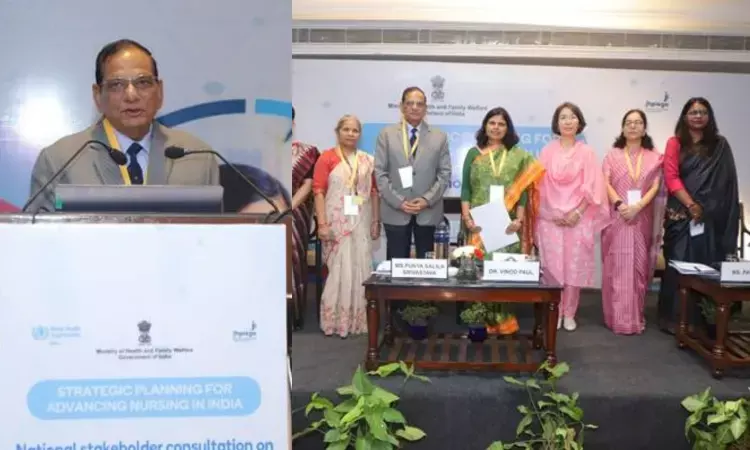- Home
- Medical news & Guidelines
- Anesthesiology
- Cardiology and CTVS
- Critical Care
- Dentistry
- Dermatology
- Diabetes and Endocrinology
- ENT
- Gastroenterology
- Medicine
- Nephrology
- Neurology
- Obstretics-Gynaecology
- Oncology
- Ophthalmology
- Orthopaedics
- Pediatrics-Neonatology
- Psychiatry
- Pulmonology
- Radiology
- Surgery
- Urology
- Laboratory Medicine
- Diet
- Nursing
- Paramedical
- Physiotherapy
- Health news
- Fact Check
- Bone Health Fact Check
- Brain Health Fact Check
- Cancer Related Fact Check
- Child Care Fact Check
- Dental and oral health fact check
- Diabetes and metabolic health fact check
- Diet and Nutrition Fact Check
- Eye and ENT Care Fact Check
- Fitness fact check
- Gut health fact check
- Heart health fact check
- Kidney health fact check
- Medical education fact check
- Men's health fact check
- Respiratory fact check
- Skin and hair care fact check
- Vaccine and Immunization fact check
- Women's health fact check
- AYUSH
- State News
- Andaman and Nicobar Islands
- Andhra Pradesh
- Arunachal Pradesh
- Assam
- Bihar
- Chandigarh
- Chattisgarh
- Dadra and Nagar Haveli
- Daman and Diu
- Delhi
- Goa
- Gujarat
- Haryana
- Himachal Pradesh
- Jammu & Kashmir
- Jharkhand
- Karnataka
- Kerala
- Ladakh
- Lakshadweep
- Madhya Pradesh
- Maharashtra
- Manipur
- Meghalaya
- Mizoram
- Nagaland
- Odisha
- Puducherry
- Punjab
- Rajasthan
- Sikkim
- Tamil Nadu
- Telangana
- Tripura
- Uttar Pradesh
- Uttrakhand
- West Bengal
- Medical Education
- Industry
Health Ministry, WHO convene workshop on Nursing sector reforms

New Delhi: Union Ministry of Health and Family Welfare, in collaboration with the World Health Organization (WHO) and Jhpiego, convened a three-day National Consultation and Experience Sharing Workshop starting 12 November 2025, on Nursing Policy Priorities and Best Practices in India to strengthen policy dialogue and advance reforms in the nursing and midwifery sector.
The workshop brought together key stakeholders, including policymakers, senior government officials, regulators, nursing educators, professional associations, and development partners from across the country.
The consultation aimed to review ongoing initiatives, identify emerging challenges, and share innovative models to strengthen nursing governance, education, and workforce management in alignment with India’s health sector priorities and the Sustainable Development Goals (SDGs).
Addressing the gathering, Smt. Punya Salila Srivastava, Union Health Secretary, highlighted that nurses and midwives form the backbone and one of the most important pillars of India’s healthcare system. She emphasized that, along with Ayushman Aarogya Mandir and ASHA workers, they are instrumental in achieving Universal Health Coverage (UHC).
She also noted that India’s recent reforms, including the establishment of the National Nursing and Midwifery Commission (NNMC), adoption of competency-based curricula, and initiatives to modernize regulatory frameworks, are major milestones in strengthening the nursing ecosystem.
She further underscored that the best practices emerging from each State during this workshop should serve as guiding inputs for national policy formulation, and other States should take note of these models for wider replication and improvement of the nursing sector across the country.
Speaking at the occasion, Professor VK Paul, Member, Health, Niti Aayog, commended the Ministry of Health and Family Welfare and WHO for convening this important consultation. India’s health system is globally recognized for providing quality healthcare, owing significantly to the strength and dedication of its nursing workforce. He reiterated that nursing is the backbone of India’s comprehensive healthcare system, he added.
Expressing concern over the quality of training of nurses, Dr Paul noted that this remains a critical area of focus. He stressed the need for reforms in nursing education and called for greater emphasis on in-service training and skill enhancement to ensure high standards of care and professional excellence.
Speaking at the occasion, Dr. Payden, WHO Representative to India, lauded the country’s significant progress in advancing the nursing and midwifery sector. She highlighted that India has emerged as one of the world’s largest contributors to the global nursing workforce. Dr. Payden also observed that the projected decline in the shortage of nurses in the WHO South-East Asia Region by 2030 can be largely attributed to the advancements and policy initiatives undertaken by India.
Participants deliberated on policy priorities such as equitable workforce distribution, quality assurance in education and training institutions, leadership development, and career progression opportunities for nursing professionals. They emphasized the importance of aligning national nursing strategies with the findings of the State of the World’s Nursing 2025 Report, and leveraging international collaborations to advance capacity-building and best practices.
Over the three days, the workshop will feature technical sessions, panel discussions, and state presentations showcasing innovations in nursing education, workforce planning, and digital learning. The deliberations aim to foster evidence-based policymaking and cross-learning among states to ensure a resilient, skilled, and empowered nursing workforce across India.
For further reference, the World Health Organization’s “State of the World’s Nursing Report” provides a comprehensive overview of global nursing workforce trends and priorities. The report can be accessed here: https://www.who.int/publications/i/item/9789240110236
Kajal Rajput joined Medical Dialogues as an Correspondent for the Latest Health News Section in 2019. She holds a Bachelor's degree in Arts from University of Delhi. She manly covers all the updates in health news, hospitals, doctors news, government policies and Health Ministry. She can be contacted at editorial@medicaldialogues.in Contact no. 011-43720751


